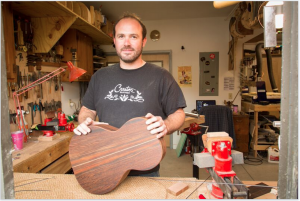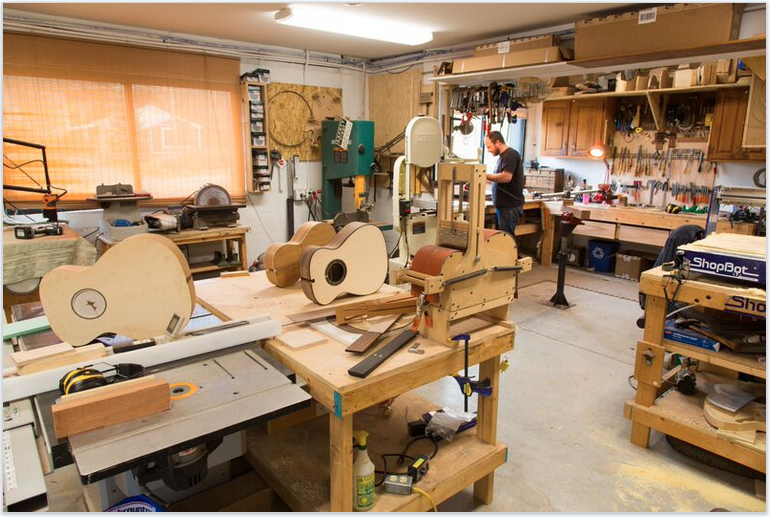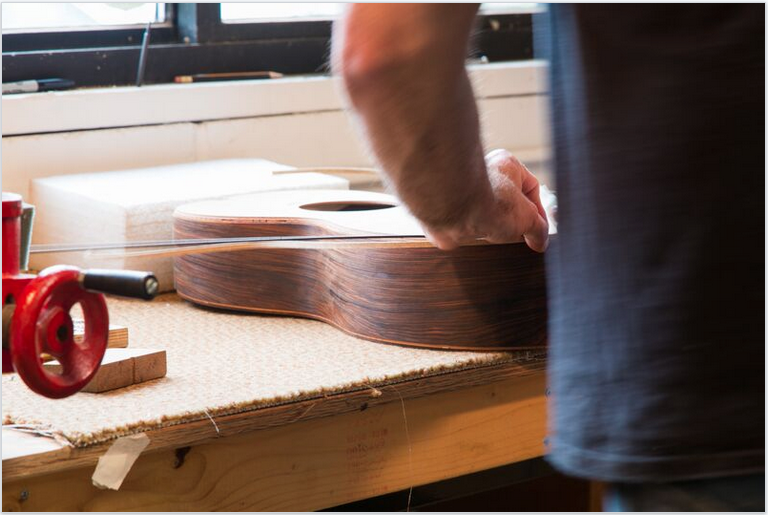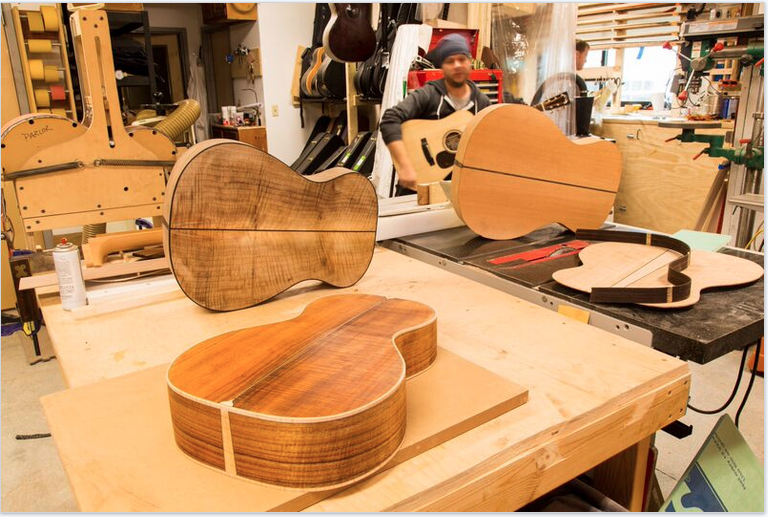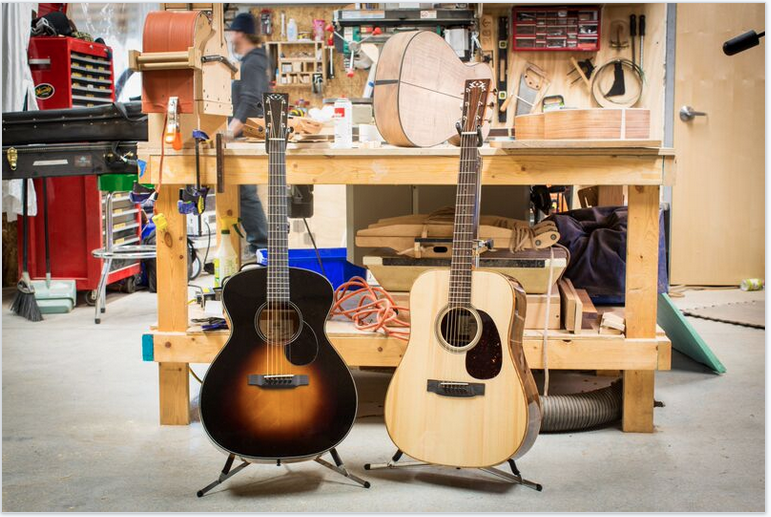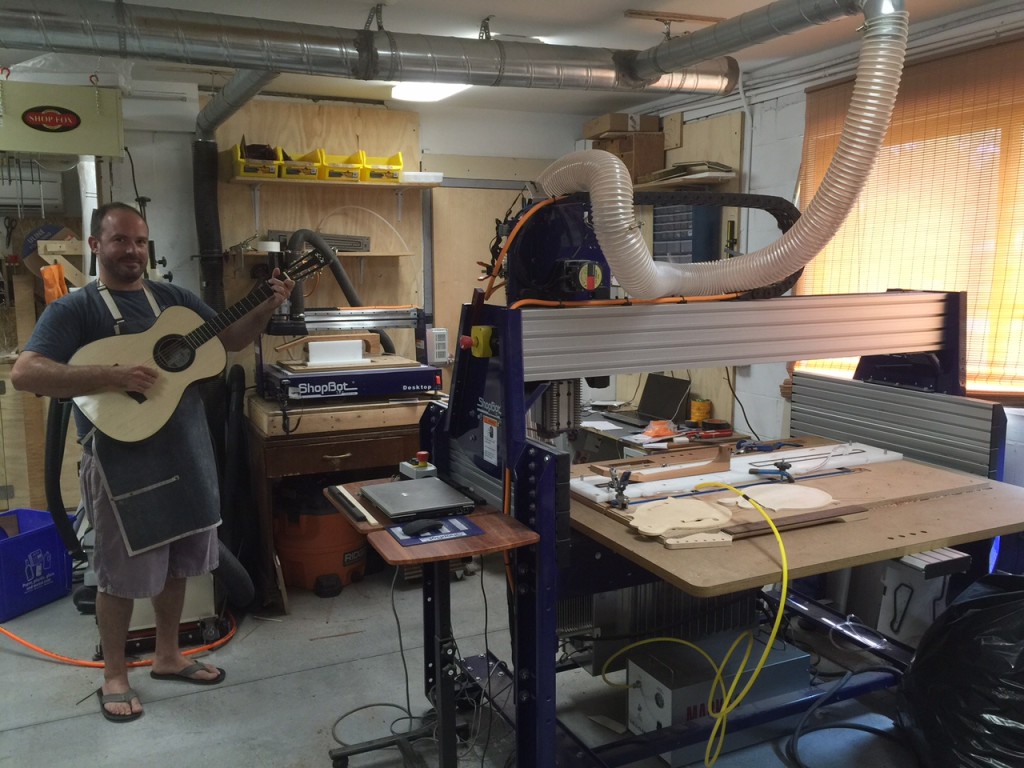Adam Buchwald is the owner and principal luthier of Circle Strings, a company he first opened in Brooklyn, NY, in 2005, and now operates in Burlington, VT, where he and his family relocated in 2008. Adam focuses on building guitars, mandolins, tenor guitars and double course tenors (ala octave mandolins). He also performs repair work. As Adam says, “My passion for instruments goes beyond building and repair work. As a working musician, who plays banjo, mandolin and guitar, I understand what a musician ultimately wants to get out of their instrument.”
It’s been an interesting path to Vermont and Circle Strings. Adam attended college at the nearby University of Vermont, and later went to work in his Dad’s business, Circle Metal Stamping, in Mt. Vernon, New York (Westchester County). The company focused on making special dies and tools, die sets, jigs and fixtures, and industrial molds. During his time at this business, Adam became aware of other companies using CNC processes to manufacture parts for Circle Metal. To incorporate CNC for metals was going to be very expensive, as well as difficult to compete with China. “I also wasn’t thrilled about having to depend on weapons contracts for my future,” notes Adam. So rather than continue the business, as his Dad looked to retirement the family opted to sell it.
Before making his move back up to Vermont, Adam learned his craft from masters. “After studying with Bob Jones in Brooklyn NY, one of the most respected and talented luthiers in the country, I felt confident enough to take on my own clients and start Circle Strings (named to honor the previous family business). I was very fortunate to have Bob right next to me while I worked on my early repairs.”
For over two years Adam was head repairman at Retrofret in Brooklyn, NY, with Steve Uhrik, Peter Kohman, and Jason Petty. “Working with them gave me the opportunity to repair and restore some of the world’s most valuable and rare instruments. It was there that I built some of my first guitars while having all of the vintage pieces, broken and playable, that I was able to study from.”
“Vermont was calling me,” says Adam. He was offered a position to teach guitar building (by hand without CNC) with George Morris at Vermont Instruments and moved up North in 2008. “I spent a few years teaching and building/repairing on the side.”
It was there that Adam met Michael Millard of Froggy Bottom Guitars. Adam “took the leap and started building with them full time.” Froggy Bottom hand-finishes its instruments, but looks to CNC for the production of certain parts. “It was an incredible experience and I learned so much about guitar building, dedication to a craft, hard work, and most importantly, myself,” notes Adam. During his time at Froggy Bottom, Adam says that he learned the value of adding CNC to the process of making a guitar, in terms of the precision and repeatability that it offers. Next, Adam opened up his own shop in Burlington.
When he first opened up Circle Strings in Vermont, Adam was primarily making the instruments by hand (with all “traditional” shop tools), and buying his guitar necks from a manufacturer who used CNC. “Though I had initially looked down a bit on CNC, believing that anything less than fully handmade wasn’t really ‘handmade,’ I came to understand the role that CNC can play within a wood shop. It’s just another tool at my disposal that adds efficiency to my work. Adding CNC to my shop is a decision that allows me to sustain and grow my business,” said Adam.
Adam first purchased a ShopBot Desktop in June of 2014. He chose the ShopBot Desktop because of its size and price, as well as the encouraging reviews that he read that noted the tool’s precision. “I also like that ShopBot makes its tools in the U.S.,” says Adam. With the assistance of Will Mosheim of Seeders Instruments, and architect/CAD technician Gabriel Stadecker (see Gabe’s bio here), Adam dove fully into using CAD/CAM in his process. “I went into this fully expecting a long learning curve, but fortunately it hasn’t been as steep as I was expecting,” says Adam. “I think the fact that I have some background in computers really helped.” Adam also notes that he was thrown a bit of a curve by the need to purchase a strong 3D modeling program (Rhino), in order to do the work he needs to accomplish. “That was an initial obstacle — the V-Carve Pro software that shipped with the Desktop didn’t come through for the 3D work.”
Overall, Adam has been impressed by the precision of the Desktop. “It almost seems surprising for a tool of this size,” says Adam. He uses the Desktop to make many parts of the guitars. “I would say that I can use CNC to make parts that are about 75% ‘there,’ and then hand-finishing comes into play.”
In this video, Adam talks about how incorporating ShopBot CNC has been helpful to his business:
Circle Strings shares a building with Creston Guitars, where luthier Creston Lea builds electric guitars and basses in a classic American style. According to Creston’s website, “Creston Electric Instruments produces custom guitars, built one at a time by one person near the old barge canal in beautiful Burlington, Vermont. The guitars are finished to look like real instruments made by a real person, not poured out of a mold on the other side of the globe. All custom guitars are designed in collaboration with the players who use them – professionals and beginners and in between.” The site notes that he uses CNC’d necks to start with and then hand-shapes and finishes them. These neck pieces are made by Creston’s neighbor Adam, on the ShopBot Buddy that Adam purchased last year.”I decided to purchase the Buddy to fit larger parts such as guitar necks onto the bed of the CNC,” said Adam.
Learn more about Circle Strings at their website. You can find out more about the ShopBot Buddy here, and the Desktop tool here.
